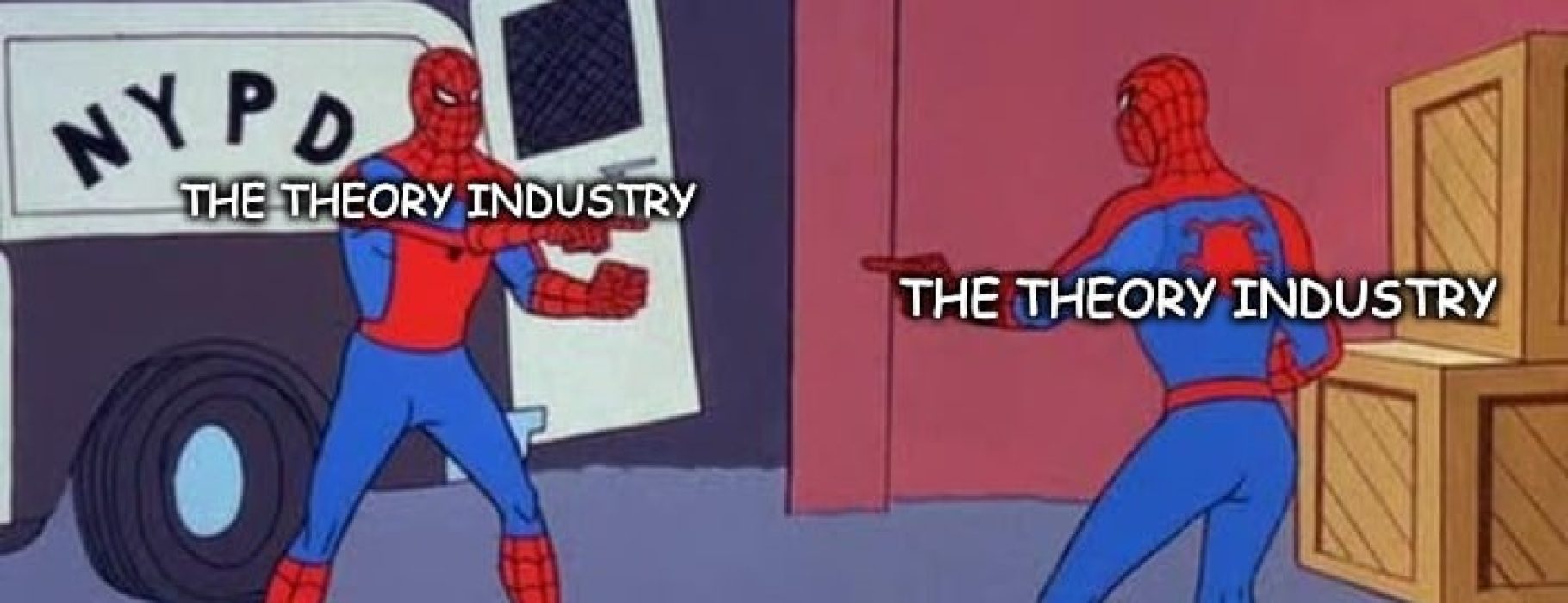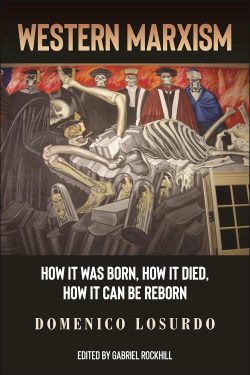In 2024, Monthly Review Press released the English translation of Domenico Losurdo’s Western Marxism: How It Was Born, How It Died, How It Can Be Reborn.1Domenico Losurdo, Western Marxism: How it Was Born, How it Died, How it Can be Reborn, ed. Gabriel Rockhill (New York: Monthly Review, 2024). Touting the book as a “fresh and challenging perspective on purportedly radical thinkers who have been promoted in the imperial core” with “wide-reaching implications for trend-setting discourses,” the publishers argue that Western Marxism raises “the stakes for what it means to produce critical theory.”2“Western Marxism: How it Was Born, How it Died, How it Can be Reborn,” Monthly Review, accessed January 21, 2025, https://monthlyreview.org/product/western-marxism/. Unfortunately, readers will find that the book contains very little that challenges the standard operating procedures of the Western theory industry. Rather than a grounded intervention into the stagnant field of Western theory, Losurdo’s is simply another iteration of the overextended analysis of philosophical texts and concepts characteristic of the worst of the Western Marxist tradition.
This missed opportunity would be merely disappointing if Western Marxism simply failed to articulate a radical vision of socialist politics. However, Losurdo’s book offers a statist conception of authoritarian socialism that fails to meet the ambition for emancipatory politics that many Western Marxists—theoretical shortcomings notwithstanding—at least aspire to.
The following review essay will make good on the preceding claims by outlining Losurdo’s argument in Western Marxism within the context of his surrounding work.3In addition to my comrades on the Spectre editorial board, I would like to thank David Camfield for inviting me on to Victor’s Children to talk about Western Marxism. The conversation gave me an invaluable opportunity to organize my thoughts on the book. David Camfield and Joshua Nicholas Pineda, “#48 A Dive into Domenico Losurdo’s Western Marxism,” December 2024, in Victor’s Children, produced by Harbinger Media, Podcast, MP3 Audio, 1:05:21, https://harbingermedianetwork.com/show/victors-children/. Given that I have very few stakes in defending the Western Marxist tradition, I will eschew nitpicking Losurdo’s interpretation of any of the specific figures examined in the book, or a reclamation project of the tradition as a whole.4An example of the latter approach can be found in the recent review published in Jacobin. Timothy Brennan, “‘Western Marxism’ is not a Monolith,” Jacobin, November 4, 2024, https://jacobin.com/2024/11/western-marxism-philosophy-theory-review. Rather, I will move internally through Losurdo’s argument to show the interlocking dependencies among his conceptions of Western Marxism, socialist revolution, and class struggle. In the first section, I argue that Losurdo’s taxonomy of Western Marxism lacks coherence. Only the “rejection of anticolonial struggle” unifies the disparate thinkers—both Marxist and non-Marxist—treated in Western Marxism. As I show in the second section, Losurdo’s identifies anticolonial struggle with a conception of socialist politics as the increase of the economic forces of production by the anticolonial state. This conception of socialist politics and the understanding of history it entails are, at best, contested. In the third section of this essay, I argue that Losurdo justifies this conception of socialist politics and the anticolonial historical conjuncture through his reconceptualization of the concept of class struggle. Losurdo’s rearticulation of class struggle extends the concept to include other antioppression struggles without any subsequent theoretical reconstruction. Rather, Losurdo simply empties the concept of its traditional empirical and theoretical content. Consequently, Losurdo renders the concept of class struggle capacious enough to include antiracist and feminist struggle only insofar as it becomes indeterminate enough to include almost any political content— including content with relatively counterintuitive and antisolidaristic “socialist” conclusions. The theoretical shortcomings of Losurdo’s argument have been obscured by the placid acceptance of Losurdo’s “method,” which—despite his calls for concrete historical and material analysis—tends to focus on decontextualized and unsystematic citation of philosophical texts.
To begin, however, I want to pose a simpler question: what is the book’s argument and what would have to be the case for this argument to be true?
On the Very Idea of Western Marxism
Western Marxism is framed as a response to Perry Anderson’s Considerations on Western Marxism. Anderson notoriously characterizes Western Marxism as an evolution in Marxist theory that abandons its traditional concerns with “economic and political” structures and reorients itself towards philosophical analysis.5Perry Anderson, Considerations on Western Marxism (New York, London: Verso, 1979), 49; Jennifer Ponce de León and Gabriel Rockhill, introduction to Western Marxism, by Domenico Losurdo (New York: Monthly Review, 2024), 13–18. This shift, he argues, resulted from the formative experience of this generation of intellectuals in the two World Wars, the vicissitudes of Bolshevik Russia, and, most crucially, the “structural divorce of this Marxism from political practice.”6Anderson, Considerations on Western Marxism, 29. Anderson notes that these developments have produced the most sophisticated and conceptually advanced versions of Marxist theory hitherto.
Given Anderson’s stature at the New Left Review and Verso publishing, Considerations is an apposite choice for Losurdo’s stalking horse. As his proponents frequently note, Losurdo’s criticism takes issue with a wide swath of contemporary theory they understand as “radical theory.”7Ponce de León and Rockhill, introduction to Western Marxism, 13. Western Marxism leans into this critique and maintains the Consideration’s argument while inverting Anderson’s “positive” evaluation.8As Timothy Brennan points out, Anderson’s assessment and diagnosis of this canon are much more ambivalent than Losurdo credits. Brennan,“ ‘Western Marxism’ is not a Monolith.” Whereas Anderson characterizes this theoretical shift as a turn to philosophy, Losurdo identifies the move as one towards religious messianism and empty moralism. For Losurdo then, the distinction between Eastern and Western Marxism is that the former accepts the reality of socialist struggle, while the latter denies it. Given his attempt to unsettle the Western theory industry evinced by his positioning of himself contra Anderson, this distinction is the core argument of the book.
At first blush, much of this argument seems intuitive. The overt recourse to abstract theory characteristic of both Western Marxism and “radical theory” has long been grist for the mills of critics from both within and outside the tradition.9Isabelle Garo’s work is a fine example of a self-conscious approach to this problem. Isabelle Garo, Foucault, Althusser, Deleuze et Marx (Paris: Demopolis, 2011); Isabelle Garo, Communism and Strategy: Rethinking Political Mediations (New York: Verso, 2023). It is noteworthy that this criticism of the hypertheoretical orientation of “radical theory” is so pervasive, that three of its most influential figures spend significant portions of a book intended to set its agenda accusing each other of abstract formalism. Judith Butler, Ernesto Laclau, and Slavoj Zizek, Contingency, Hegemony, Universality: Contemporary Dialogues on the Left (New York: Verso, 2011). Unfortunately, Losurdo’s critique relies on a rough characterization of Western Marxism as an attitude towards his specific conception of socialist struggle, rather than on a distinct theoretical perspective or set of premises shared by the “Western Marxists.” Given the heterogeneity of the thinkers included in the book, it is questionable whether Western Marxism, as defined in Western Marxism, exists in any meaningful sense.10More than other reviewers, Brennan begins to pose this question, noting, “So we may be talking about something else, rather than a grand territorial divide of ideology between the decolonizing East…and an effete flank distracted by the allure of bourgeois urbanity… slip[ing]into anarchistic dead ends and moralizing postcapitalist idylls.” Brennan, “‘Western Marxism’ is not a Monolith.”
Losurdo presents the development of Western Marxism in a loose chronological fashion. Again mirroring Anderson, he begins with the experiences of the First and Second World War amongst Western socialists. Losurdo contrasts this to the experience of Eastern Marxists located in the periphery and colonized world. The divergent experiences of Eastern and Western Marxists led to a split between their understandings of anticapitalist struggle.11Losurdo, Western Marxism, 69–72. On one side, a Western version focuses on the conflict between proletarians against capitalists. On the other, an Eastern version focuses on that between the colonized against colonizing nations. This bifurcation widened in the face of the dilemma (referred to as Danielson’s dilemma) between redressing the inequality between classes within a state and that of addressing inequality between nations.12Losurdo, Western Marxism, 83–88. For Losurdo, following both paths is difficult because rapid modernization exacerbates existing inequalities within a state, whereas a more equitable socialist model slows down development.
Losurdo’s characterization of Western Marxism as the rejection of power springs from this dynamic. Western Marxists ultimately refuse to accept this dilemma, whereas Eastern Marxists—motivated by the exigencies of maintaining power and building actually existing socialism—turn to rapid modernization. For Losurdo, the Western Marxists’ rejection of rapid industrialization and all that follows amounts to a rejection of anticolonial struggle. Losurdo contends that eliminating the inequalities between states is a necessary step to ensure the fledgling socialist nations avoid military annihilation and colonial dependence on their capitalist rivals.


